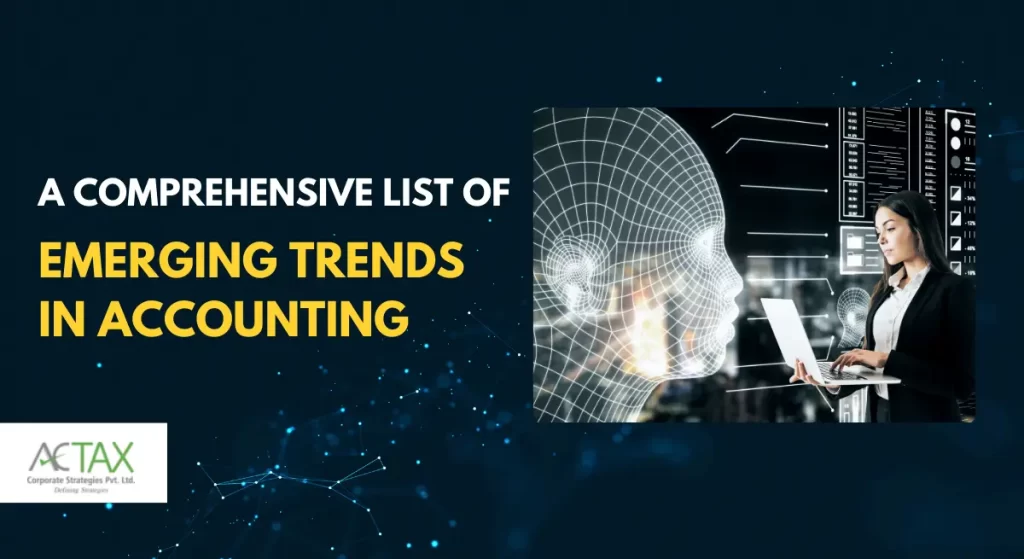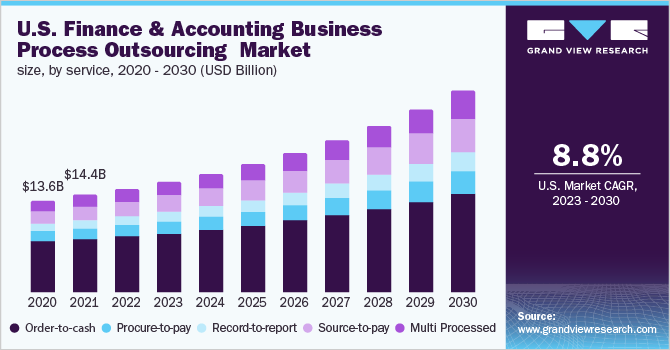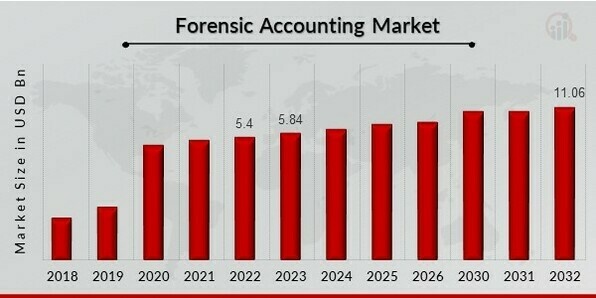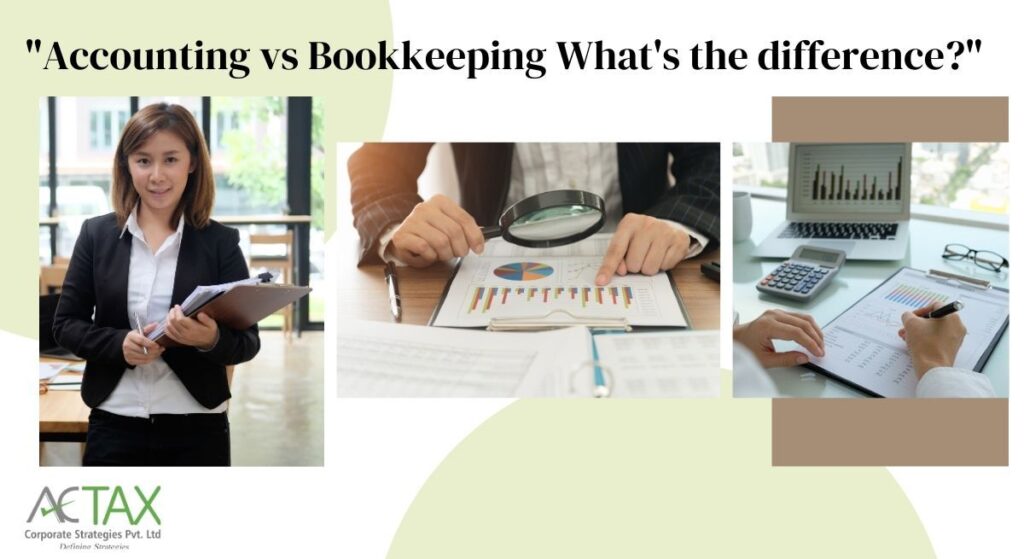The Emerging trends in accounting industry emerged rapidly over the years, backed by swift global technological advancements. From the advent of AI (Artificial Intelligence) and ML (Machine Learning) to blockchain technology to the uprising trend of sustainability and wellness, the accounting landscape also kept on evolving accordingly.
Such lightning evolution shook the industry experts due to shifting skills demand, requiring different strategies and changing client expectations. So, here’s a quick catalog of all the emerging trends in accounting that are going to impact the future strategies of accounting experts.
Table of Contents
Recent Trends in Accounting: Recapping 2024 & Forecasting 2025
To begin with, here’s a brief recap of all the accounting trends that gathered momentum in 2023, backed by a precise data-driven analysis of whether such trends are still going to be impactful in 2024 or not.
Latest Accounting Trends in 2025: It's the extended Automation of 2024 & More!
1. Evolving Accountancy Role:
The traditional role of the accountants has shifted more towards an advisory format, as their traditional roles of data calculation, maintenance, and interpretation are taken over by automation and accounting software.
Here to Stay?
A 2023 Survey (conducted by ShareFile), revealed that 95% of the accountants leverage technology to effectively streamline their workflows. This is because of the shifting role of the accountants, wherein they automate data, based on which they guide the clients. This is one of the recent emerging trends in accounting.
2. Blockchain Technology:
Blockchain technology has typically reduced the reconciliation and ledger maintenance expenses of the accounting sector.
Here to Stay?
According to the predictive analysis of Gartner, by the end of 2024, at least 50% of the global MNCs will be leveraging blockchain technology to facilitate transactional record-keeping, which basically signifies ledger maintenance. Here’s another latest accounting trend in accounting.
3. Hyper Automation of Accounting Services
Breaking down the hyper-automated accounting service that’s been proactively used by the majority of Tech Savvy Accountants in India also globally. What’s really there in this?
As of now, accounting services like bookkeeping, basic auditing, preparation of balance sheets, financial statements, and so on, have been taken over by the process of automated accounting. There has been a huge shift from the traditional (i.e., manual) norms of accounting in this regard.
Now Hyper-Automated accounting involves real-time accounting & deeper implementation & integration of generative AI into their working tools. In simple terms, it can be assumed that automated accounting will gain momentum in the future as one of the most dominant latest emerging trends in accounting for 2025.
Here to Stay?
Webinar Care’s Accounting Statistics 2024 revealed two key points in this context. Firstly, 29% of automated technology is leveraged by the accounting industry.
Secondly, 50% of the accounting tasks are conducted through accounting automation.
As per the recent study conducted by our professionals, it has been discovered many accounting automation tools are offering a feature to embed their financial tools into their business systems.
4. Data Security in Accounting Firms
The accounting industry is responsible for storing a wide range of sensitive financial data. Given the growing number of cybercrimes from all across the world, financial security breaches have become a real concern. Herein, the data security systems help to prevent such breaches.
With the increase in remote work culture, recording financial data online & cloud-based systems exposes firms to potential cyber threats.
Here Are Some Quick Stats Highlighting Data Security Risks –
- Cyberattacks on Accounting Firms have increased by 30% in 2024, due to the easy availability of very sensitive financial data of individuals & businesses.
- According to IBM’s Cost of Data Breach Report 2024, the average cost of data breaches in the financial sector rose to $5.3 Million per incident.
- The most commonly reported cyber threat in 2024 is Phishing, the worst part of it is that accounting firms are targeted for Phishing.
What’s Here To Stay?
Enhanced Cybersecurity protection is required for any accounting firm to secure the sensitive business & financial data of their’s & their clients. You have to work with Accounting tools that offer enhanced protection against cyber threats & ransomware attacks.
In August 2023, the Digital Personal Data Protection Act, of 2023 was enacted, wherein data protection provisions for the financial sector were also included. In this context, it must be understood that a regulatory requirement validates the ongoing trend of data security in India within the financial sector.
How to Protect Your Accounting Firms from Cyber Threats in 2025?
- Train Employees regularly to identify phishing attempts & follow best password hygiene practices. Keep changing them too.
- Secure access controls to your accounting software. You have to ensure that only authorized personnel can view sensitive data.
- Protect your Internet services with special firewalls. Track all the activities performed by employees in real-time.
- Inculcate the habit of taking regular backups of all your financial data to prevent data loss due to ransomware attacks.
5. Outsourcing & Remote Workforce, Add legal services Too!
Outsourced accounting services have become a dominant trend within the accounting industry, wherein most Indian companies avoid keeping in-house accountants. Rather, they opt for outsourced accounting services to save costs. This trend is further backed up by remote working facilitations.
In other words, a lot of these accounting firms, that outsource their services, tend to keep a remote workforce of Chartered Accountants & associated professionals.
Here to Stay?
According to Grand View Research, the global outsourced accounting market was worth USD 56.42 billion as of 2022. It is further expected to grow steadily at a rate of 9.1% annually until 2030, thereby taking up the spot for a key emerging trend in accounting.
However, as reported by Business Insider, in India, remote job preferences from the perspective of the employer dropped 14% in September 2022 (after the final closure of the global pandemic). Hence, it can be estimated that the trend of remote work facilitations within the accounting sector might come to an end in 2024.
6. Predictive Analytics:
Presently, the accounting industry leverages big data, the science of forecasting, and data analytics to manifest cash flow forecasting, credit risk management, and customer payment predictions. In simple terms, predictive analytics are used to make financial predictions.
Here to Stay?
The Institute of Management Accountants reveals in the Indian context, that 32% of Indian accounting firms have already implemented big data and 35% of them are planning to. Similarly, 25% of these firms have further implemented predictive modeling and 33% of them are planning to. Hence, predictive analytics can also be classified as an emerging trend in accounting.
7. Sustainability & ESG Reporting:
Sustainability reporting has become increasingly dominant nowadays (backed by the global agenda of sustainable development), as it is responsible for tracking a company’s environmental, social, and governance (ESG) performance. Hence, sustainability accounting has come up as a brand new branch of non-traditional accounting services, wherein business positioning and performances are analyzed through non-financial values.
Here to Stay?
Although sustainability and ESG reporting have gained global popularity, they can never be categorized under the segment of mainstream accounting. Simply speaking, this is because accounting is all about quantitative data, and sustainability accounting can get vague due to its qualitative nature. An EY Survey revealed that 80% of the investors think “too many companies fail to properly articulate the rationale for long-term investments in sustainability”, further clarifying the aforesaid claim.
8. Wellness
The concept of wellness gained momentum in the field of accounting because it is used as a strategy to improve the mental and physical health quotients of accounting professionals, as they undergo huge stress and significant burnout, due to their challenging job nature.
Here to Stay?
QX Accounting Services reveals that 66% of working accountants suffer from issues associated with anxiety. 59% of them are stressed and 34% of them are suffering from depression. Hence, the context of wellness is going to play a very crucial role (i.e., elimination of mental health issues and manifestations for holistic development) in the future, for the sector to flourish peacefully, thereby taking up the spot for a key emerging trend in accounting.
9. Agile Accounting:
Agile accounting refers to the phenomenon of rapid evolution in response to the changing market/industry patterns in the field of accounting. The concept has gained momentum because of the competitive and volatile accounting landscapes.
Here to Stay?
According to the Growth Report of Mordor Intelligence, regarding the trends of the Indian accounting industry, the CAGR of the industry will increase by 4% by 2029. The report also forecasted the rapid evolution of services (within the Indian accounting industry) due to the increasingly complex business environments; for which the adoption of agile principles will become inevitable. Hence, this can be categorized as yet another emerging trend in accounting.
10. Proactive Accounting:
Future focus, data-driven strategies, and collaboration are the three core pillars of proactive accounting. The concept has gained momentum because it takes active steps to understand the underlying financial health of a business. It is either used to fix issues or to leverage opportunities, associated with financial health.
Here to Stay?
According to a study conducted by Wasp Barcode (as referenced by OHI in 2022), 47% of the SMBs believed that their accountants were not proactive, for which unnecessary losses were incurred by them, showcasing the significance of proactive accounting. So, it can be deduced that the concept of proactive accounting is here to stay.4.5. 8
Latest Emerging Trends in Accounting: What New Trends to Expect in 2025?
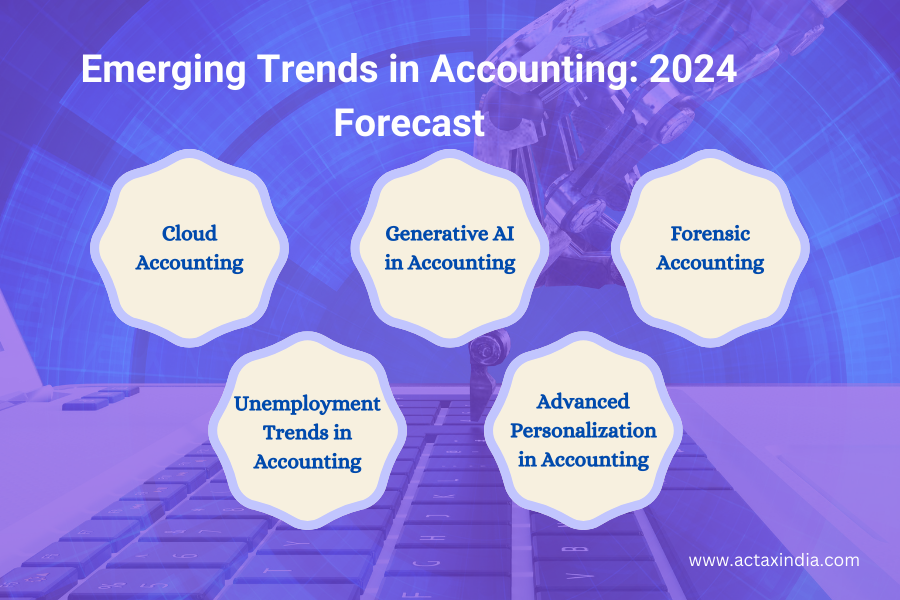
Now, coming to the next segment, it must be mentioned that the Indian accounting landscape is highly volatile at present, due to the rapid technological evolutions in certain out-of-the-box areas (e.g., Generative AI) and consecutively changing market situations. Hence, you can expect practically anything eccentric! However, here’s a list of a few properly explained forecasts (i.e., about the emerging trends in accounting) that have been made based on popular opinion and quantitative considerations.
1. Cloud Accounting
Just like the core advantages of cloud computing (e.g., seamless accessibility, centralized data security, etc.), cloud accounting allows businesses, especially startups to access any of their financial data from anywhere and from any device, given there is an internet connection. In simple terms, this phenomenon enables accountants to work from any location. It further ensures multi-user facilitation, allowing bookkeepers, accountants, and clients to collaborate simultaneously. It is a software, which offers features like generation of financial reports, expenditure management, time tracking, ROI tracking, sending invoices, and so on.
Cloud Accounting as an Emerging Trend in Accounting
The “Global Cloud Accounting Software Market Research Report, 2023-2030” revealed that in 2022, the cloud accounting software market was worth over 4 billion USD. The market is expected to grow significantly each year (at a rate of 10% to be precise), eventually reaching the mark of USD 7.5 billion by the end of 2028. The 2024 Accounting Statistics of Webinar Care further reveals some core statistics in this context:
- 67% of global accountants favor cloud accounting.
- Switching to cloud accounting has the potential to boost business revenue by 15%.
- Organizations that use cloud accounting attract more clients (5 times more to be precise).
2. Generative AI in Accounting
Generative AI refers to any kind of artificial intelligence that has the potential to generate a wide range of content (i.e., texts, audio, images, video, etc.), based on user instruction. GenAI is highly interactive by nature, having the potential to understand user intent. Hence, from a very rational point of view, Generative AI can help accountants create automated financial reports, analyses, interpretations, and forecasts, based on the available financial data, within a few seconds. Fraud detection is yet another utility of GenAI that can be leveraged by accountants to identify anomalies while analyzing a balance sheet.
Use of Generative AI as an Emerging Trend in Accounting

A KPMG survey revealed that 83% of accountants use or would prefer using GenAI for financial planning. Herein, financial planning involves the use of predictive models, budget insights, and scenario creation. A McKinsey Report of December 2023 forecasted “Generative AI has the potential to deliver significant new value to banks- between $200 billion and $340 billion” in the years to come. The report further estimated that the corporate banking section and the retail banking sector would benefit the most from GenAI. According to Mordor Intelligence, the global AI market is expected to grow from $1.56 billion in 2024 to $6.62 billion in 2019.
3. Forensic Accounting
Forensic accounting deals with the identification and subsequent prevention of financial crimes like embezzlement, financial fraud, tax evasion, and so on. It has a lot to do with anomaly detection, for which the previous trend of AI Accounting can be leveraged. The forensic accounting market is presently in the growth phase, due to reasons like increasing financial crimes, enhancing complexity of global transactions, robust and complicated technological evolutions, and rising instances of corporate scandals.
All these growing complexities, in turn, have pushed the Governments of various countries (including India) to incorporate regulations associated with forensic accounting.
Forensic Accounting as an Emerging Trend in Accounting
According to the “Forensic Accounting Market Research Report” of 2024 by Market Research Future, in 2022, the forensic accounting market was valued at USD 5.4 billion. The market is expected to grow swiftly at a rate of 8.3% each year over the upcoming decade. By the end of 2032, the market is estimated to reach a value of USD 11.06 billion.
In the Indian context, Business Today reported that the “Forensic Accounting and Investigations Standards” became mandatory from July 1, 2023, for all ICAI members, showcasing the growing relevance of forensic accounting.
4. Unemployment Trends in Accounting
In the previous section, it was deduced that the remote work accounting trend might experience a downward curve in 2024. Due to these remote work facilitations, employers were missing out on the most talented accountants. As a result, there has been a drop in the quality of work, which in turn, pushed employers to opt for automated accounting.
Now, the growing instance of automated accounting reduced the requirement for a lot of manual accounting services. To put it simply, AI and automation replaced human intelligence, eventually curbing the demand for accountants, and giving rise to unemployment.
Unemployment as an Emerging Trend in Accounting
According to the Bureau of Labour Statistics, the 2% unemployment rate for global accountants increased up to 3.5% within a gap of the second quarter, after the resolution of the COVID-19 situation. Hence, in 2024, it can be assumed that this trend of unemployment will be dominantly present.
A Blog by Sagenext revealed some unemployment statistics (rate) for 2024 in the field of accounting; which suggests that global accountants and auditors are presently experiencing an unemployment rate of 1.4% respectively. Auditing, accounting, and bookkeeping clerks are further experiencing an unemployment rate of 1.5% respectively. Most importantly, financial analysts are experiencing an unemployment rate of 3.2%.
5. Advanced Personalization in Accounting
Accounting personalization, as the term suggests, refers to the application of customization principles in accounting services, as per the needs, requirements and demands of the customers. CRM technology forms the basis of this customer-centric approach. To put it precisely, by incurring data from the CRM technologies, the accountants can improve their decision-making processes (e.g., enhance strategic decisions regarding product pricing), tailor financial solutions (e.g., provide investment recommendations to the clients) and subsequently strengthen client relationships (e.g., by reducing financial errors and manifesting transparent reporting).
Personalization Accounting as an Emerging Trend in Accounting
According to Forbes, in 2020, 89% of digital businesses (both product-based and service-based) invested in personalization. As deduced previously, the trend of accounting automation is going to stay here, it can be deemed that the accounting industry is more of a digitized sector now. By integrating these two findings, it can be inferred that the accounting sector, being a part of the digital industry, will be more prone to personalization to stay relevant in the market, and in front of the customers. Moreover, 98% of global marketers state personalization enhances customer relationships (Forbes).
Conclusion: How to Keep Up With The Rapidly Emerging Accounting Trends?
The simplest way to keep up with the rapidly emerging accounting trends is through upskilling yourself. Whatever the trend, self-upgradation never goes in vain.
If you’re an accountant or an accounting service provider, digitize yourself robustly. You can learn relevant digital skills associated with accounting automation, blockchain technology, agile accounting, cloud accounting, and AI accounting tools to stay competitive.
AI accounting and cloud accounting have gained significant momentum since the beginning of 2025, so staying updated about them can help you to further be on track with the emerging trends in accounting. Follow Actax India for more such informative blogs!
